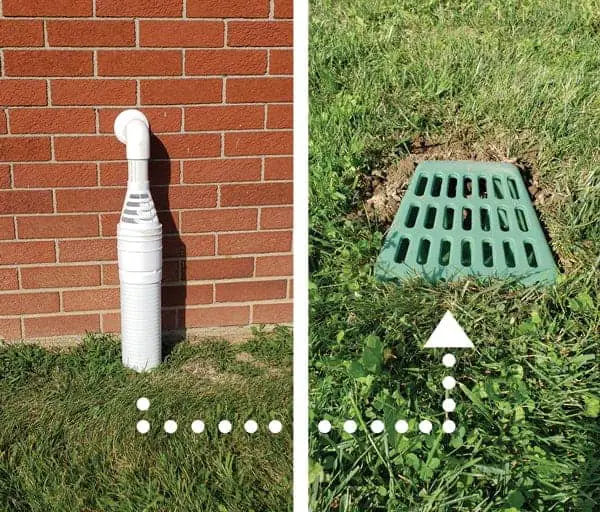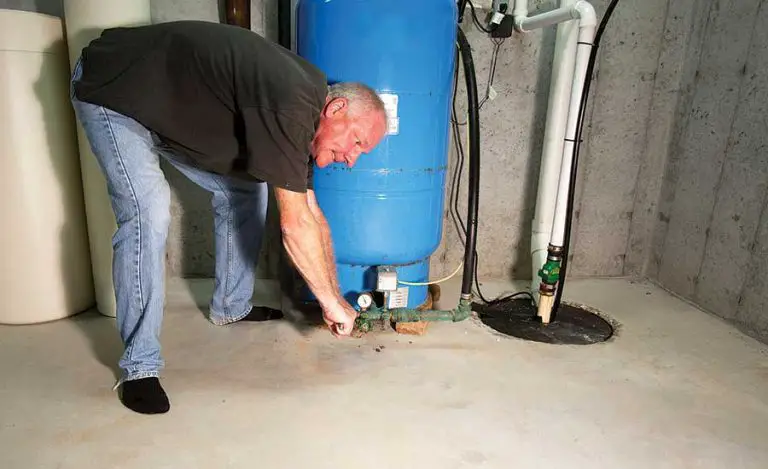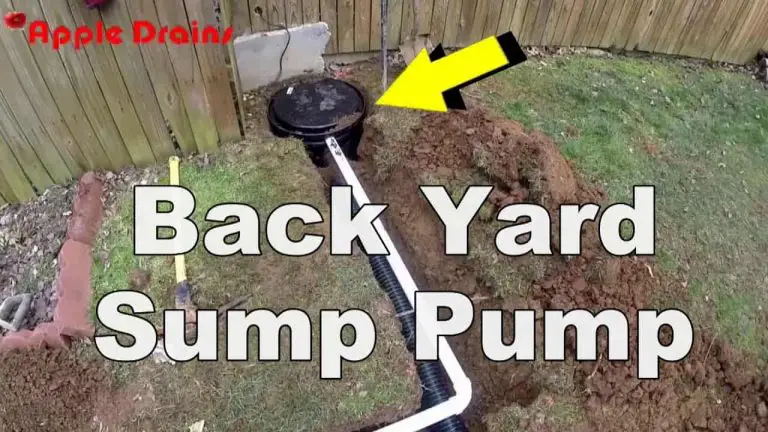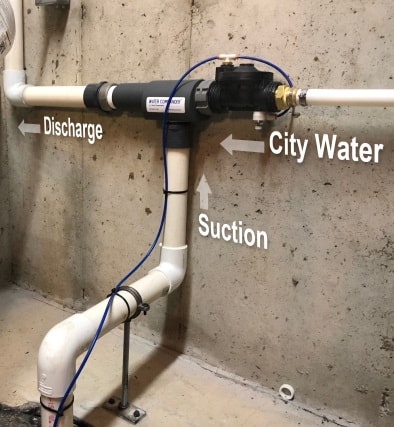Can a Sump Pump Battery Be Covered
As the rainy season approaches, many homeowners are wondering if they should cover their sump pump battery. The answer is yes, you can cover your sump pump battery to protect it from the elements.
There are a few things to consider when choosing a cover for your sump pump battery. A sump pump battery can be covered if you live in an area where freezing temperatures are common. By covering your sump pump battery, you can extend its life and keep it working properly during the winter months.
Powering A Sump Pump | Ecoflow Portable Power Station
Sump Pump Battery Replacement
If your sump pump is running on battery power, you’ll eventually need to replace the batteries. Here’s what you need to know about sump pump battery replacement.
Most sump pumps come with a backup battery system that kicks in when the power goes out. This is an important feature, as it prevents your basement from flooding if the power goes out and the main pump fails.
The downside of this system is that batteries don’t last forever. Eventually, they will need to be replaced.
How often this needs to be done depends on the type of batteries you have and how often they are used. Lead acid batteries are the most common type used in sump pumps.
They typically need to be replaced every 3-5 years. Lithium ion batteries are newer and can last up to 10 years before needing replacement.
When replacing lead acid batteries, it’s important to recycle them properly. Many communities have recycling centers where you can take old lead acid batteries for safe disposal.
When shopping for new batteries, make sure you get ones that are compatible with your sump pump system. You’ll also want to make sure they are rated for deep cycle use, as regular car or boat batteries won’t work as well and won’t last as long.
Run Sump Pump on Battery
If your sump pump is connected to a backup power source, such as a generator or battery, you may be wondering if it’s necessary to run your sump pump on battery. The answer is yes! Running your sump pump on battery is important for two main reasons: 1.
To keep your basement dry during a power outage 2. To prolong the life of your sump pump Let’s take a closer look at each of these reasons: 1.
To keep your basement dry during a power outage If there’s one time you need your sump pump to work, it’s during a power outage. If your basement starts to flood while the power is out, running your sump pump on battery will ensure that water is pumped out of the basement and doesn’t cause any damage.
Sump Pump Battery Charger
If your sump pump runs on battery power, it’s important to have a backup charger on hand in case of power outages. A sump pump battery charger is a device that plugs into a standard outlet and charges the battery, keeping it topped off and ready to go.
There are a few things to keep in mind when choosing a sump pump battery charger. First, make sure the charger is compatible with the type of battery you have.
Second, consider the charging speed – some chargers are faster than others. And finally, think about portability – if you need to move the charger around, look for one with a long cord or built-in wheels.
Once you’ve found the perfect sump pump battery charger, simply plug it in and let it do its job. Check on the status of the charge regularly to ensure that your pump is always ready to go – and never be caught without power again!
Sump Pump Battery Maintenance
Sump pumps are an essential part of any home flood prevention system, but they need regular maintenance to keep them running properly. One important part of sump pump maintenance is making sure the battery is in good condition.
Most sump pumps are powered by electricity, but during a power outage, a battery-powered backup system kicks in to keep the pump running. That’s why it’s important to regularly check and maintain your sump pump battery.
Here are some tips for keeping your sump pump battery in top shape: 1. Check the voltage regularly.
A healthy battery should have a voltage of 12 volts or more. If the voltage drops below 12 volts, it’s time to replace the battery.
2. Clean the terminals.
Over time, corrosion can build up on the terminals and cause problems with electrical flow. Use a wire brush or sandpaper to clean off any corrosion before it becomes an issue.
3. Keep it charged.
Even if you’re not using the backup system, it’s important to keep the batteries charged so they’re ready to go when you need them most. Plugging into a charger once every few months should suffice; just make sure to unplug before you leave home for extended periods of time (like vacations). By following these simple tips, you can ensure that your sump pump will be there when you need it most!
Best Sump Pump Battery
A sump pump battery is a device that helps to remove water that has accumulated in a sump pit. This type of battery is typically used in homes that are located in areas where there is a high water table or where flooding is common.
A sump pump battery can be used to remove water from the pit and to keep the area dry. The best sump pump batteries are those that are made with lead-acid cells.
These types of batteries are able to provide a high level of power and they are also very durable. Lead-acid batteries are also very affordable and they can be found at most hardware stores.
Another option for a sump pump battery is a lithium-ion battery. These types of batteries are much more expensive than lead-acid batteries, but they offer a number of advantages.
Lithium-ion batteries are lighter weight and they have a higher discharge rate than lead-acid batteries. Additionally, lithium-ion batteries do not require as much maintenance as lead-acid batteries and they have a longer life span.
Battery Backup for Existing Sump Pump Lowe’S
If your home is prone to flooding or has a history of power outages, you may want to consider investing in a battery backup for your sump pump. A battery backup sump pump will keep your pump running even if the power goes out, helping to prevent basement flooding.
There are a few things to consider when choosing a battery backup sump pump. Firstly, you’ll need to decide which type of battery you want to use.
Lead acid batteries are the most common type used in sump pumps, but they require regular maintenance and can be quite heavy. Lithium ion batteries are becoming more popular as they are lighter and require less maintenance, but they can be more expensive upfront.
Once you’ve decided on the type of battery you want to use, you’ll need to select the right size for your needs. The size of the battery will determine how long it will run your sump pump in the event of a power outage.
If you live in an area with frequent or long-lasting power outages, you’ll need a larger battery that can run your pump for extended periods of time. Finally, you’ll need to install your new battery backup sump pump according to the manufacturer’s instructions.
This usually involves connecting the PumpBuddy™ controller unit to your existing sump pump float switch wiring. Once installed, test your system periodically by unplugging your primary sump pump and making sure that your backup system kicks in and runs correctly.
A battery backup sump pump is a great investment for any home vulnerable to flooding or power outages. By choosing the right size and type of battery for your needs and following proper installation instructions, you can rest assured that your basement will stay dry even when the lights go out!
How Does Sump Pump Battery Backup Work
A sump pump battery backup is a device that helps to keep your basement dry during a power outage. It works by using stored energy in batteries to run the pump when there is no electricity available.
This can be helpful in areas where flooding is common or if you experience regular power outages. There are two main types of sump pump battery backups: those that use AC power and those that use DC power.
AC powered units will typically provide more power and run for longer periods of time than DC powered units. However, they are also more expensive and require more maintenance.
DC powered units are less expensive and easier to maintain, but they may not provide as much power or run for as long as AC units. When choosing a sump pump battery backup, you should consider the size of your basement, the amount of water that needs to be pumped, and how often you experience power outages.
You should also decide whether you want an AC or DC unit. Once you have made these decisions, you can choose the specific model that best meets your needs.
Battery Backup for Existing Sump Pump Amazon
Most homes in the United States are equipped with a sump pump. These devices are used to remove water that has accumulated in a sump pit, typically located in the basement or crawlspace of a home.
While sump pumps are designed to provide reliable and effective protection against flooding, power outages can render them useless. A battery backup for an existing sump pump can be a lifesaver in the event of a power outage.
These units provide an independent power source that kicks in when the electricity goes out, ensuring that your sump pump continues to run and keep your home dry. There are a few things to consider when shopping for a battery backup for an existing sump pump.
First, you’ll need to determine the size of unit you need based on the horsepower of your current pump and the capacity of your battery. Second, you’ll want to choose a unit that includes automatic charging so that you don’t have to remember to manually recharge it.
Finally, make sure to select a unit with enough power outlets to accommodate all of your other emergency devices, like flashlights and radios. The best way to ensure that your home is protected from flooding is to install a battery backup for your existing sump pump. With this simple addition, you can rest assured knowing that even if the power goes out, your sump pump will continue to run and keep your home safe and dry.

Credit: www.uswaterproofing.com
Does Sump Pump Work Without Battery?
No, a sump pump will not work without a battery. The battery is what provides the power to the pump and allows it to operate.
How Many Years Does a Sump Pump Battery Last?
A sump pump battery typically lasts between 3 and 5 years. However, the specific lifespan of a sump pump battery will depend on several factors, including the type of battery, the quality of the battery, how often it is used, and how well it is maintained.
What Do I Do With My Old Sump Pump Battery?
If you have an old sump pump battery that you are no longer using, there are a few things you can do with it. You can recycle the battery, sell it for scrap metal, or dispose of it properly.
Recycling: Recycling your old sump pump battery is a great way to keep it out of landfills. Most batteries contain lead and other heavy metals that can be harmful to the environment if not disposed of properly.
Many recycling centers will accept lead-acid batteries like sump pump batteries. Call around to find a local recycling center that accepts batteries and drop off your old one today! Selling for Scrap Metal: Another option for disposing of your old sump pump battery is to sell it for scrap metal.
Lead-acid batteries contain a small amount of valuable metals like lead and copper that can be sold for cash at most scrap yards. Be sure to call ahead to check what types of batteries they accept and how much they pay per pound before heading over.
Proper Disposal: If you cannot recycle or sell your old sump pump battery, you will need to dispose of it properly. Lead-acid batteries should never be thrown in the trash as they can leak harmful chemicals into the ground and water supply.
Are Sump Pump Battery Backup Worth It?
Are Sump Pump Battery Backup Worth It? As any sump pump owner knows, these devices are vital to keeping your basement dry. But what happens when the power goes out and your sump pump can’t do its job? That’s where a battery backup comes in.
A battery backup system will keep your sump pump running even when the power is out. This is an important feature to have, especially if you live in an area that is prone to severe weather conditions like thunderstorms or hurricanes.
The cost of a battery backup system will vary depending on the size and features of the unit. However, most systems typically range from $200 to $500. So, while it may be a significant investment upfront, it could end up saving you a lot of money in the long run by preventing water damage to your home.
Conclusion
If you have a sump pump in your basement, you know how important it is to keep it running properly. One part of the sump pump that is often overlooked is the battery.
You may not think that a battery needs to be covered, but it does. The reason why you need to cover your sump pump battery is because batteries can leak acid.
If the acid from a battery comes into contact with your skin, it can cause burns. Even if the acid does not come into contact with your skin, it can still damage your sump pump.
Acid can eat away at the metal and plastic parts of your sump pump, causing it to break down prematurely. Covering your sump pump battery will protect it from leaks and also keep dirt and debris out of the battery compartment.
A simple piece of tape over the opening of the battery compartment will suffice. Be sure to check on your batteries regularly to make sure they are not leaking and to replace them when necessary.






